At the heart of Bahadurabad stand two sister institutions, Dr. Aisha’s Health Vision Hospital and the IQ Institute of Neuropsychiatry – united by a belief that true healing is both scientific and human.
What began as a family-led vision has grown into two independent yet allied healthcare centers. Each serves a different dimension of well-being – the body and the mind – but both are rooted in the same core value: compassion that goes a little further.
These are not just hospitals. They are places of presence, where people are seen, listened to, and cared for in ways that are personal, consistent, and kind.
A Message from our Founder
When we began this journey in 1992, there was no building – just a room, a handful of beds, and a belief: that healthcare should be more ethical, more compassionate, and more accessible. That belief gave birth to the IQ Institute of Neuropsychiatry, a small psychiatric unit built on trust, dignity, and clinical sincerity.
As the years passed, that vision expanded. What began as a modest mental health facility has since evolved into two independent yet connected institutions: IQ, now a full-fledged psychiatric and neurodevelopmental hospital, and Dr. Aisha’s Health Vision Hospital, our general care division that offers a wide spectrum of medical and surgical services.
Though we’ve grown in space and structure, our purpose remains the same: to lead with compassion and serve with integrity, always offering a little extra care.
Thank you for being part of this journey. Whether you enter as a patient, a student, or a partner—know this: your story is seen, your health matters, and your healing is our shared goal.
– Dr. Shafiq Thahim
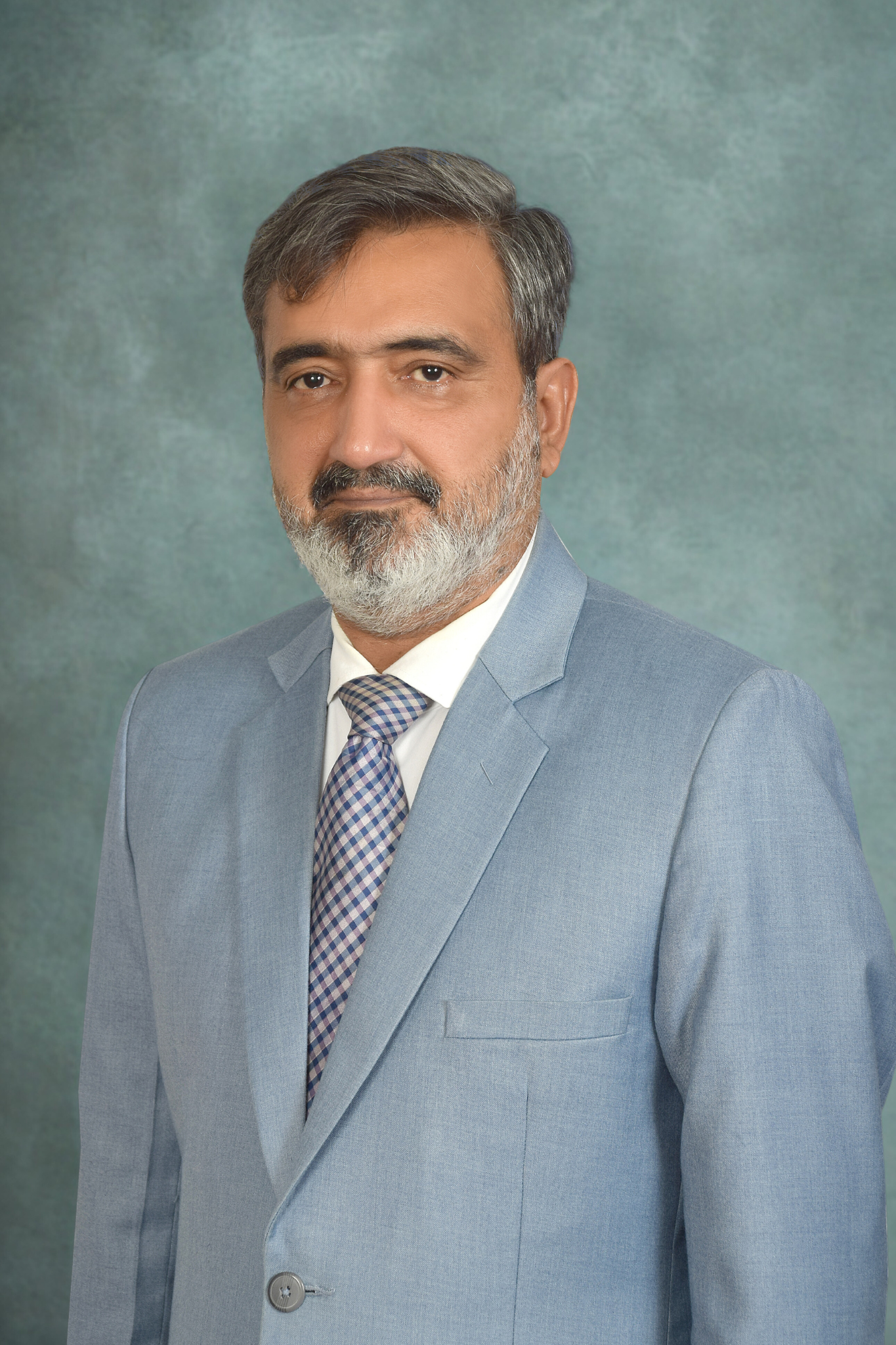
Our Vision
To become a model for integrated, people-centered healthcare in Pakistan—where general medicine and mental health services operate side by side, guided by the belief that healing begins when care goes beyond the expected.
Our Mission
To deliver ethical, accessible, and person-centered care for both body and mind—anchored in a little extra care that goes beyond treatment to transform lives. We work across health, education, advocacy, social justice, and sustainable development. Through training, knowledge, and compassion, we prepare future professionals and build communities that are healthier, more resilient, and more humane.
Moments That Shaped Our Mission
A look back at some of the milestones that reflect our journey of service, impact, and growth.
- 1994 – Training the Next Generation
- 1999 – A Mission is Registered
- 1999 – Trusted Beyond the Hospital Walls
- Early 2000s – Shaping Pakistan’s Psychiatric Landscape
- 2000 – Community Recognition in the Press
- 2000 – Extending Care Across Borders
- 2000 – Giving Voice to the Forgotten
- 2001 – Crisis Relief in Tharparkar
- 2001 – Emergency Relief in Badin
- 2002 – Partnering with the United Nations
- 2002 – A Landmark Partnership
- 2002 – Cricket for a Cause
- 2003 – A Night to Remember
- 2003 – Breaking the Silence on AIDS
- 2003 – Bryan Adams Rocks Karachi
- 2004 – Education with Dignity
- 2004 – AIDS Awareness Behind Bars
- 2005 – Earthquake Relief in the North
- 2006 – Ongoing – Mental Health & Nutrition for Children
- 2007–2009 – Microfinance, Big Impact
- 2010 – Students Rebuild Hope in Jacobabad
- 2010 – Ongoing — Access to Clean Water
- 2012 – Distributing Relief with Dignity
- 2014–2015 – 80,000+ Vaccinated Against Hepatitis B
- 2015 – Ongoing – Restoring Sight, Restoring Lives
- 2016 – Community Care, One District at a Time
- 2017–2019 – Shelter Support for Vulnerable Families
- 2021 – Post-Flood Relief Mapping & Outreach
- 2025 – Faith, Education, and Community
Long before formal recognition, Health Vision was already shaping the future of healthcare. In 1994, The Aga Khan University’s School of Nursing partnered with our team to deliver psychiatric nursing workshops in Karachi.
This collaboration wasn’t just a one-off — it laid a foundation for training programs that blended real-world clinical exposure with empathy-based care. Students didn’t just observe; they engaged, asked, learned — and carried that experience forward into hospitals across Pakistan.
At Health Vision, education has always meant empowerment. And we’ve never forgotten the power of a strong beginning.
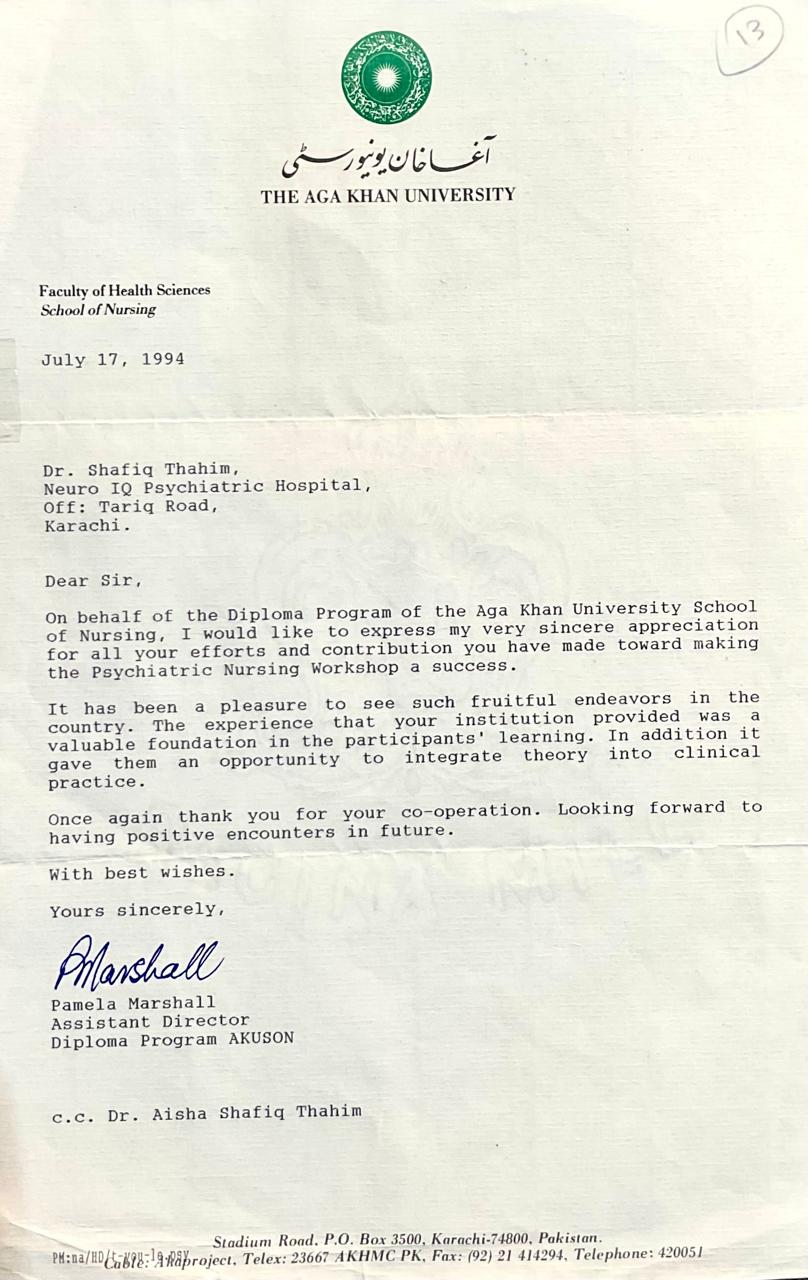
In 1999, Health Vision officially registered as a welfare organization under the Directorate of Social Welfare, Government of Sindh. But our story began long before the paperwork.
Founded on a simple belief: that quality healthcare should never depend on how much you can pay – Health Vision stepped into underserved communities with mobile clinics, psychiatric outreach, and medical relief. From addiction awareness to disaster response, every project carried the same promise: a little extra care.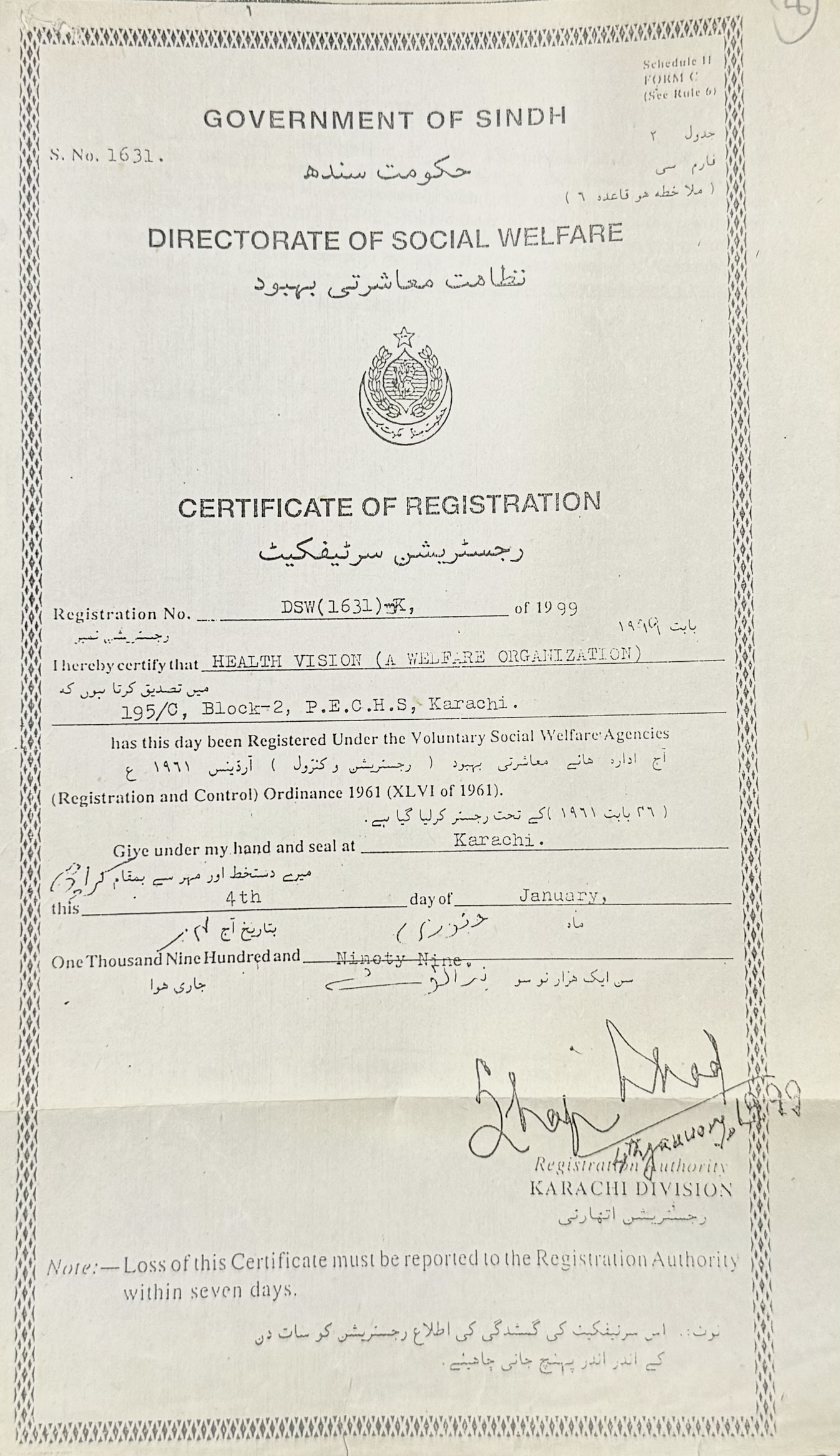
In 1999, the medical teams from IQ and Dr. Aisha’s Health Vision Hospital (then known as Surgeon Munawar Ali Memorial Hospital) extended their care beyond clinical settings, supporting one of Karachi’s leading educational institutions — The C.A.S. School.
This early example of community-based mental health care foreshadowed the outreach-focused model we continue to follow today.
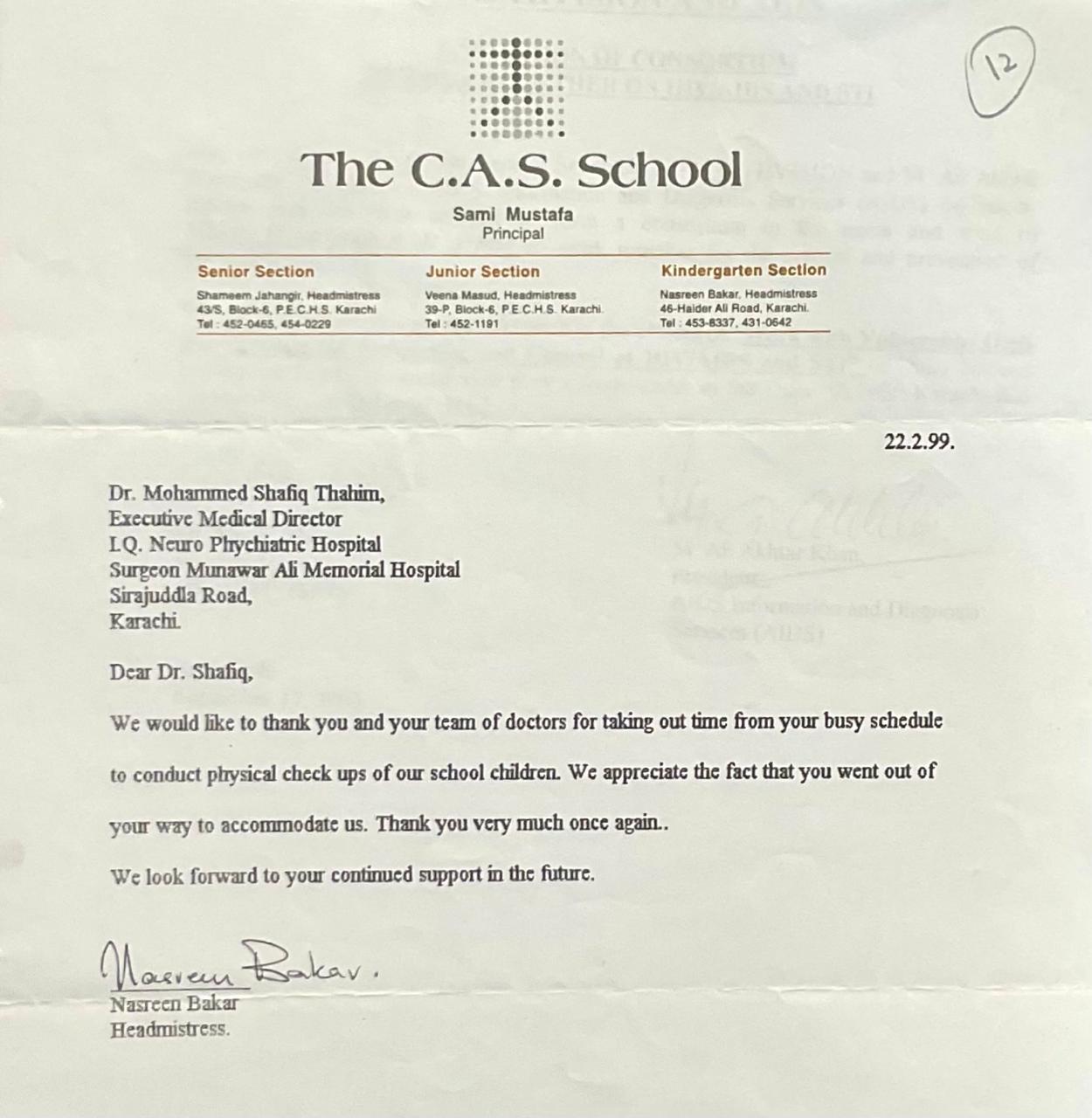
Health Vision played a key role in the First National Psychiatric Conference, held at the Karachi Marriott Hotel and organized by Hamdard University.
Dr. Aisha Shafiq and Shafiq Thahim served as two of the chairpersons, contributing their deep expertise in community psychiatry and rehabilitation-based care. Their involvement reflected Health Vision’s growing role in shaping national mental health conversations.
With participation from prominent clinicians and policymakers — including the British Consul General — the conference was a landmark moment in advancing psychiatric awareness and cross-institutional collaboration in Pakistan.
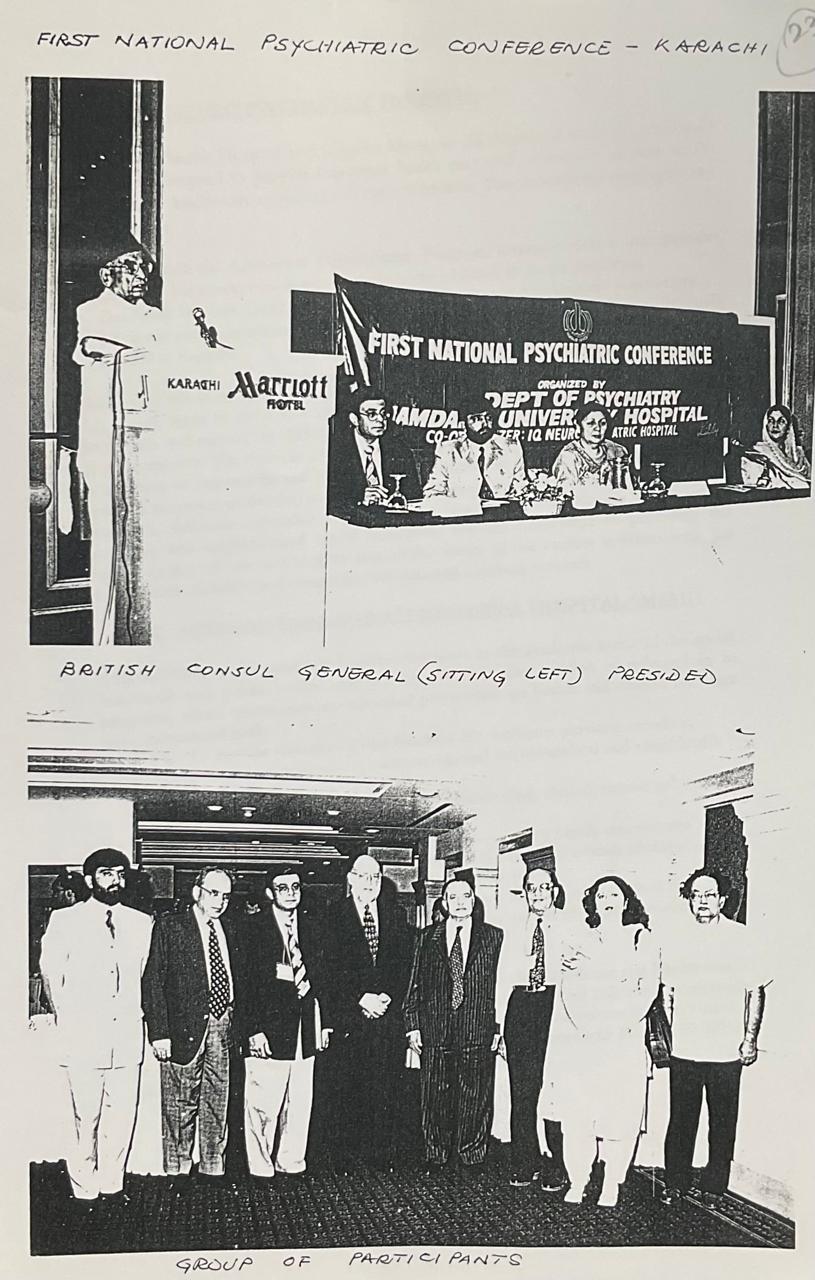
On May 18, 2000, Health Vision’s work in psychiatric care and community engagement was featured in Daily Ummat, one of Karachi’s major Urdu-language newspapers.
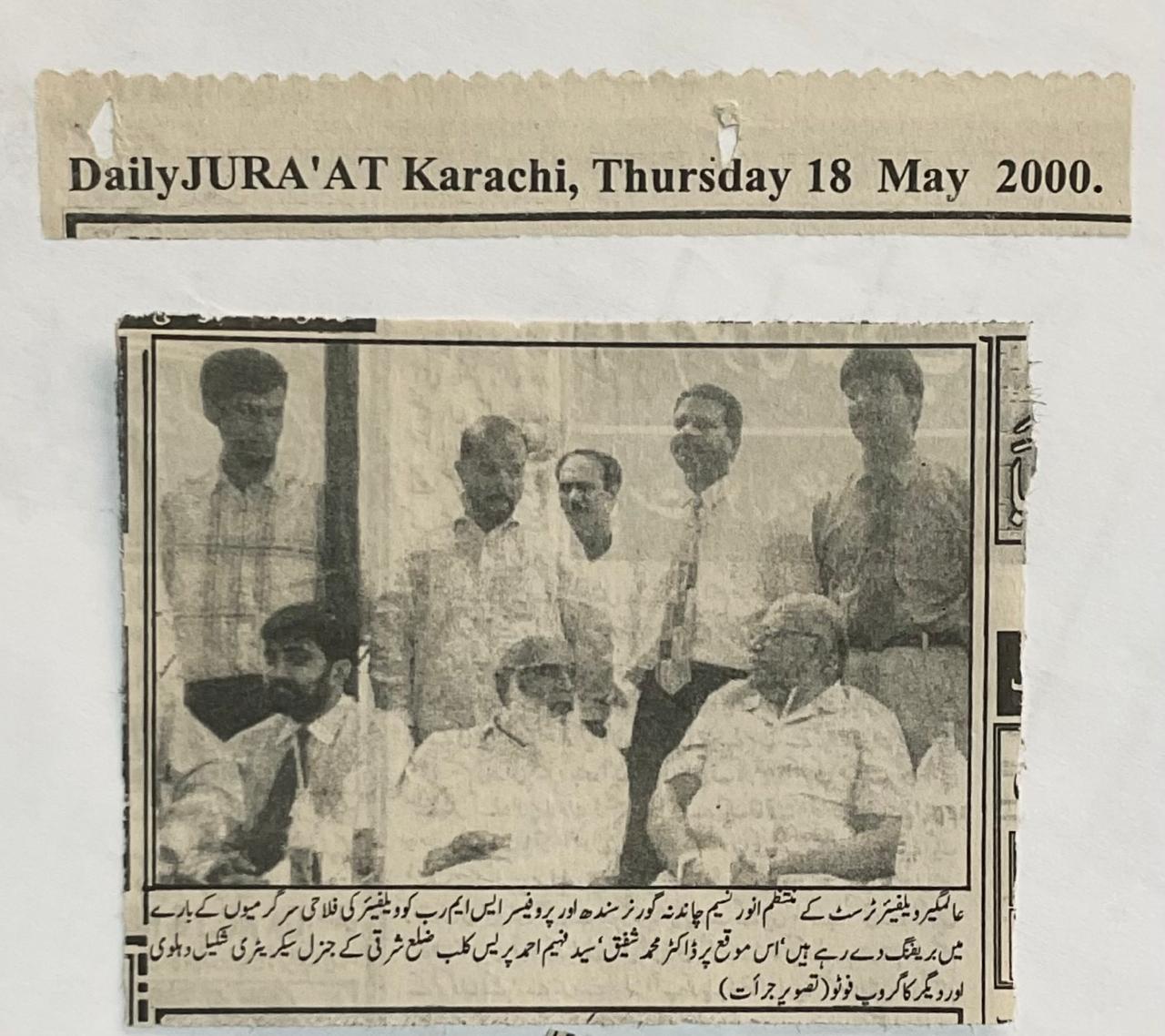
This coverage not only acknowledged the tireless efforts of our founders and early team members — it also marked a turning point in public awareness of our mission. From media to ministry, the call for mental health care was beginning to echo beyond hospital walls.
When injured Nepalese climbers needed urgent care after a tragic mountaineering accident, they were flown to Pakistan and treated at Dr. Aisha’s Health Vision Hospital (then known as Surgeon Munawar Ali Memorial Hospital).
The story was covered by The News International, spotlighting how our hospital, in partnership with the Pakistan Girl Guides Association and other organizations, responded to the humanitarian crisis.
This wasn’t just clinical intervention. It became a moment of national solidarity. Within days, provincial ministers and the Governor of Sindh visited the hospital to meet the patients and commend the care team.
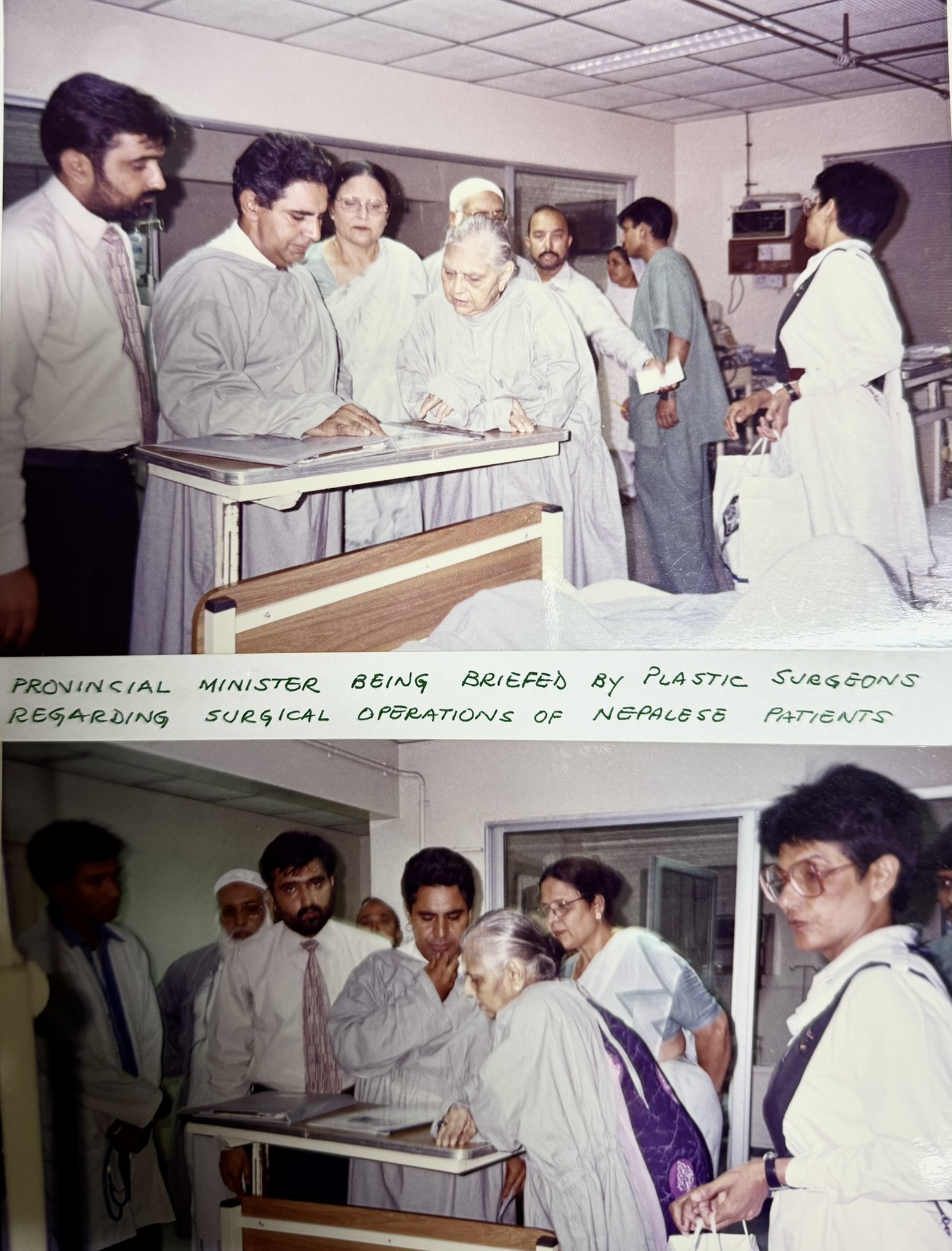
The visit reflected the scale of empathy mobilized in response to the tragedy. What began as emergency care grew into a symbol of cross-border humanity — where politics, power, and public health aligned for a single purpose: compassion.
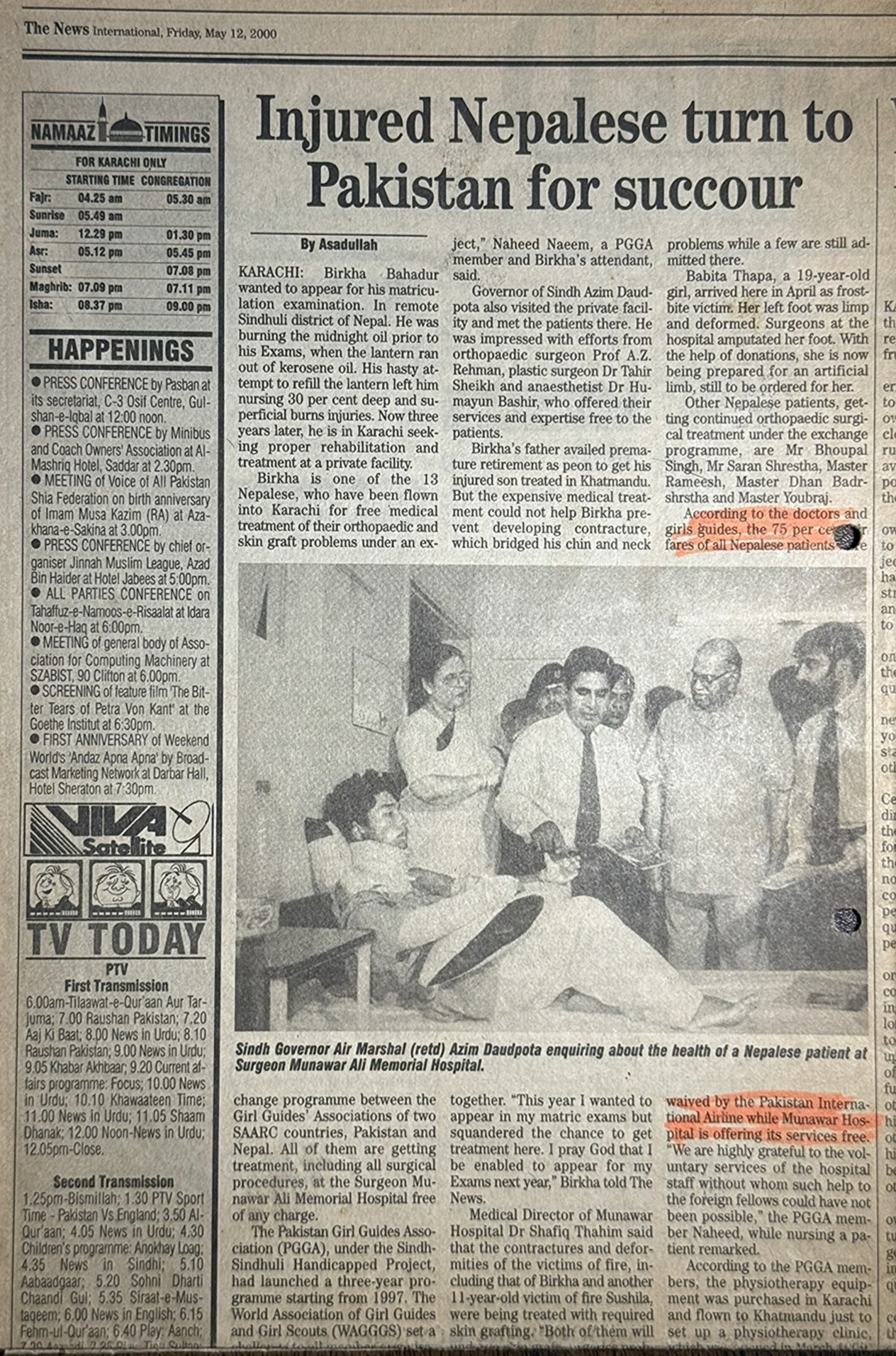
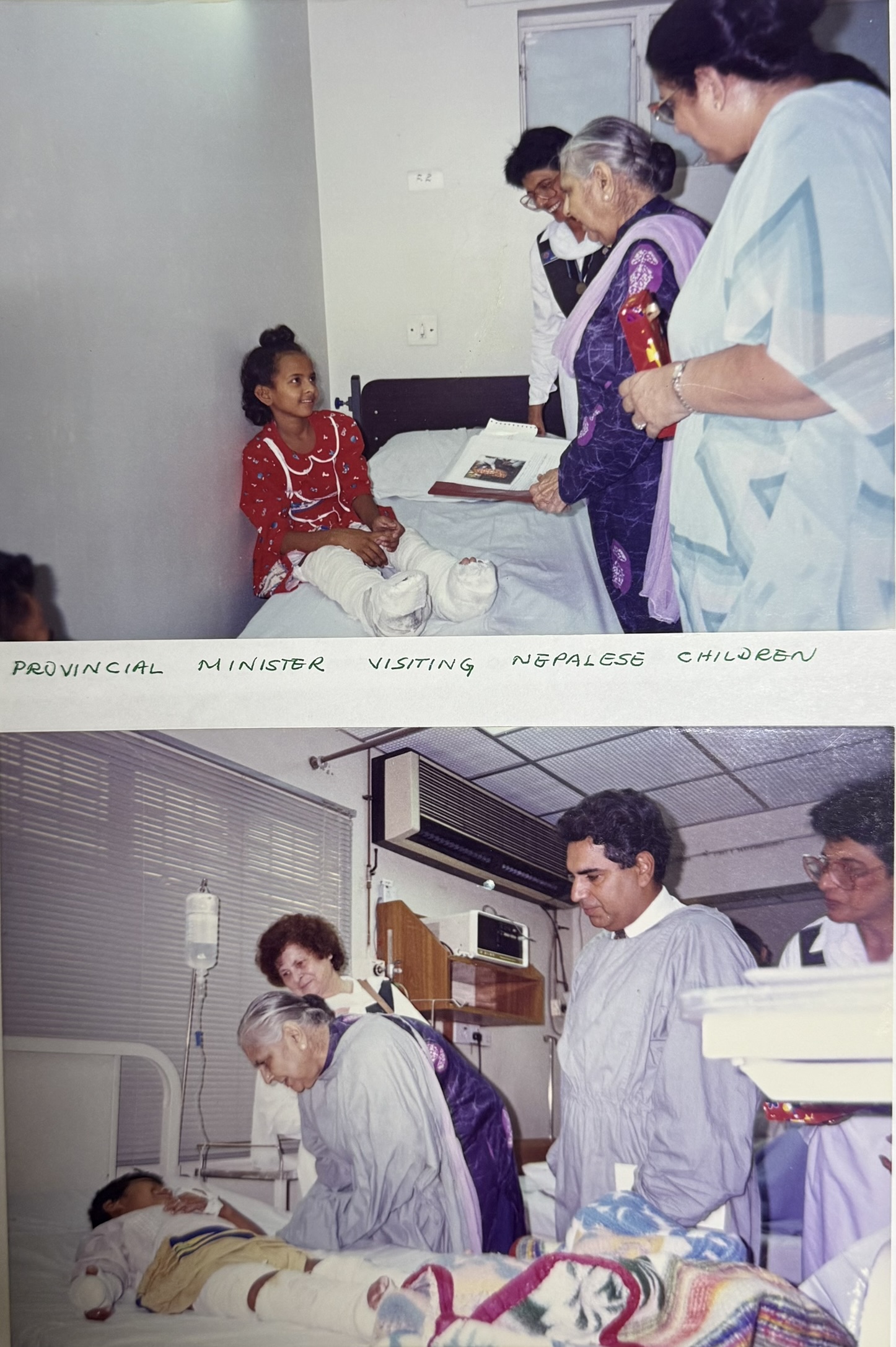
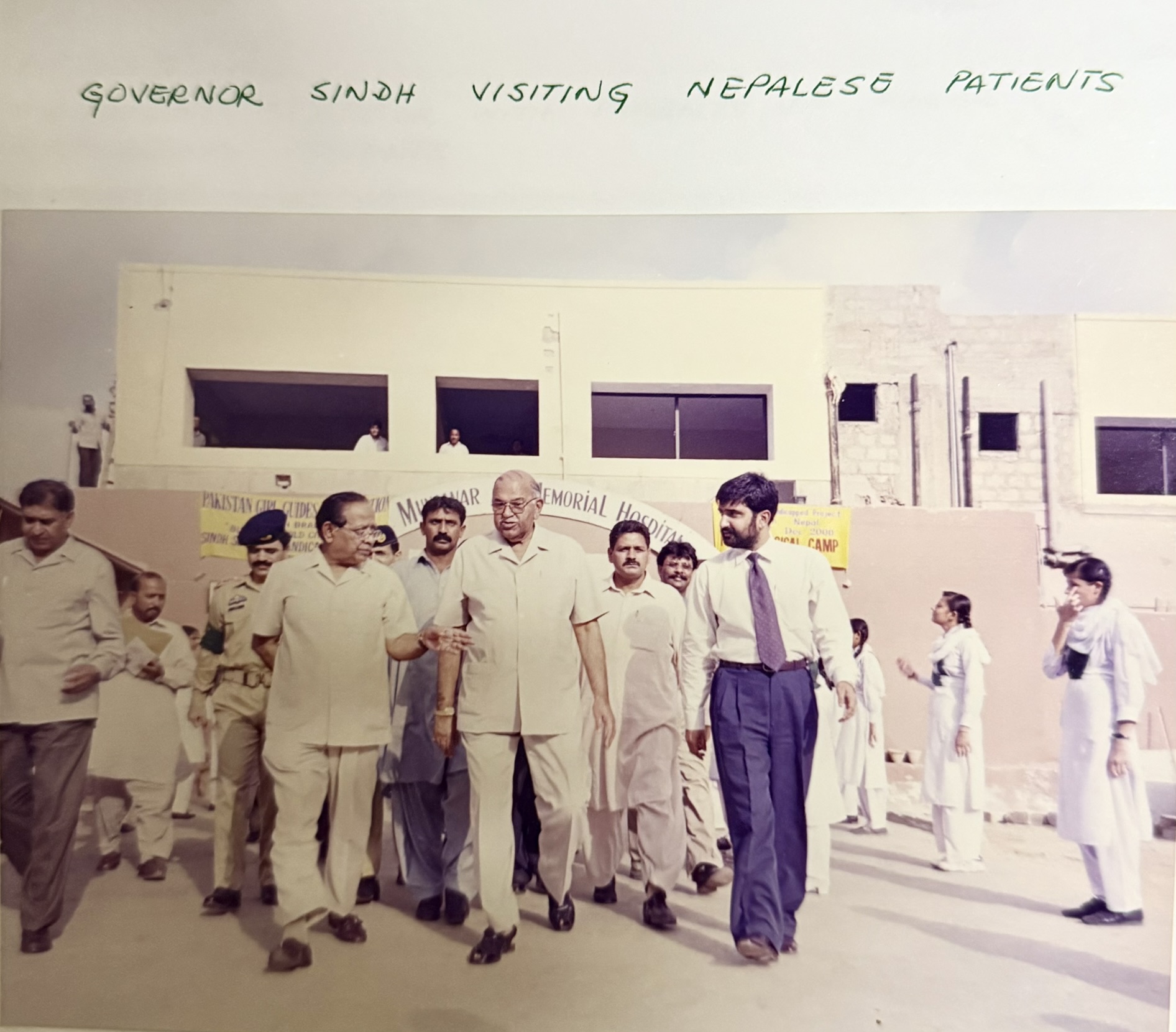
In collaboration with leading psychiatrist, Prof. Amin Gadit, Health Vision co-led a groundbreaking study titled “Children of the Corn” — one of the earliest psychiatric investigations inside Karachi’s juvenile prison.
The study uncovered alarming truths:
- 6% of children were subjected to torture.
- 52% needed psychotherapy.
- 17% required psychiatric medication.
- Many showed signs of deep trauma, psychosis, and disordered personality traits rooted in abandonment, abuse, and systemic neglect.
Health Vision’s role was instrumental in both conducting and supporting the research. It wasn’t just an academic project — it was an urgent call to action, pushing for early mental health intervention to prevent a future pipeline to criminality.
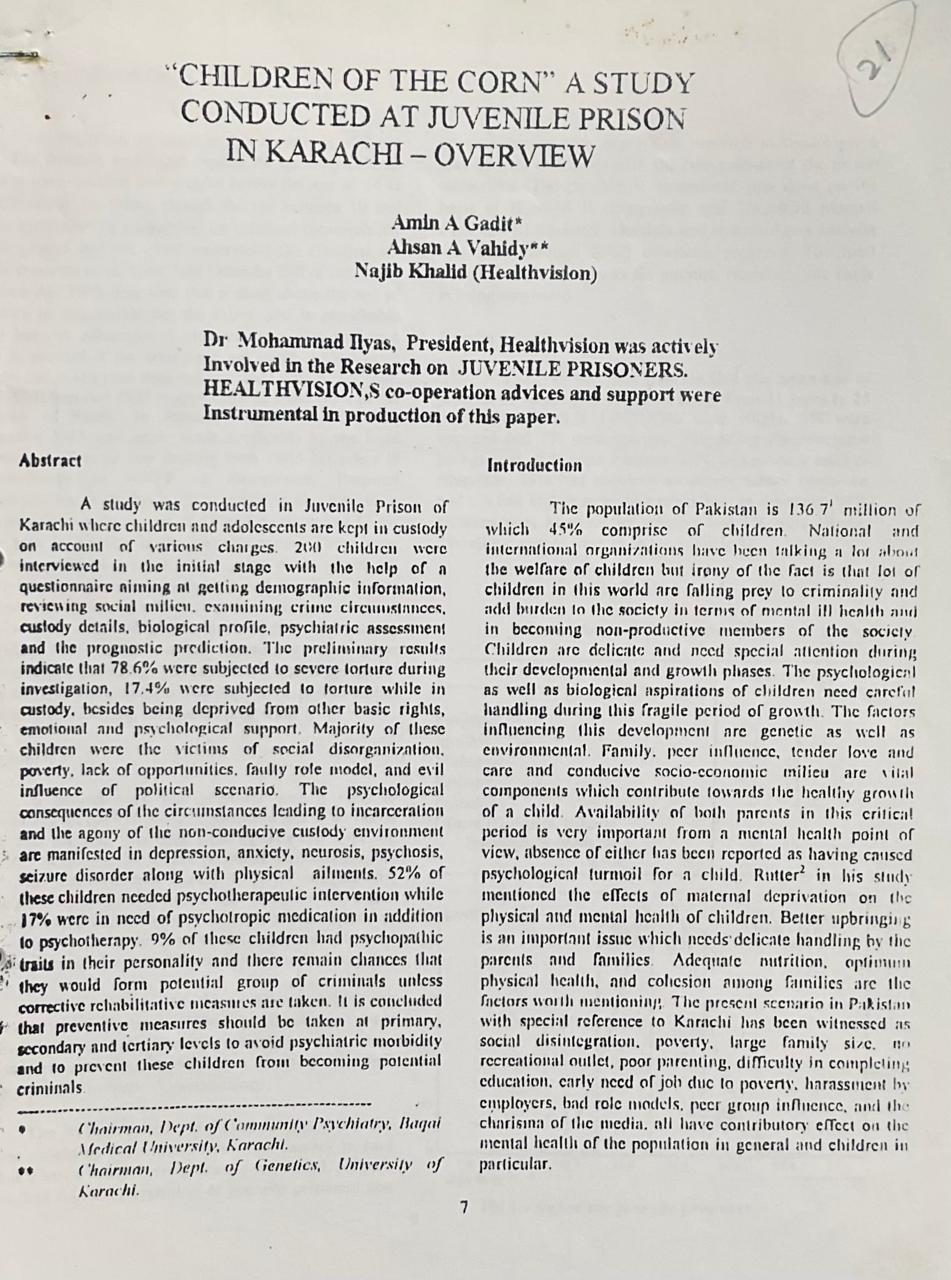
This moment marked Health Vision’s emergence as a strong advocate for prison reform, trauma-informed care, and rehabilitation-first justice for children.
Amid a severe drought in Tharparkar, Sindh, Health Vision mobilized a large-scale food distribution and medical relief effort — reaching deep into some of the most marginalized areas of Sindh.
Thousands gathered to receive essential aid under the open sky — a striking moment of grassroots solidarity. Among the Health Vision team was Imran Khan, who at the time was a rising public figure and later went on to serve as the Prime Minister of Pakistan.
His presence helped amplify the urgency of the crisis, drawing national attention to the suffering in Thar.
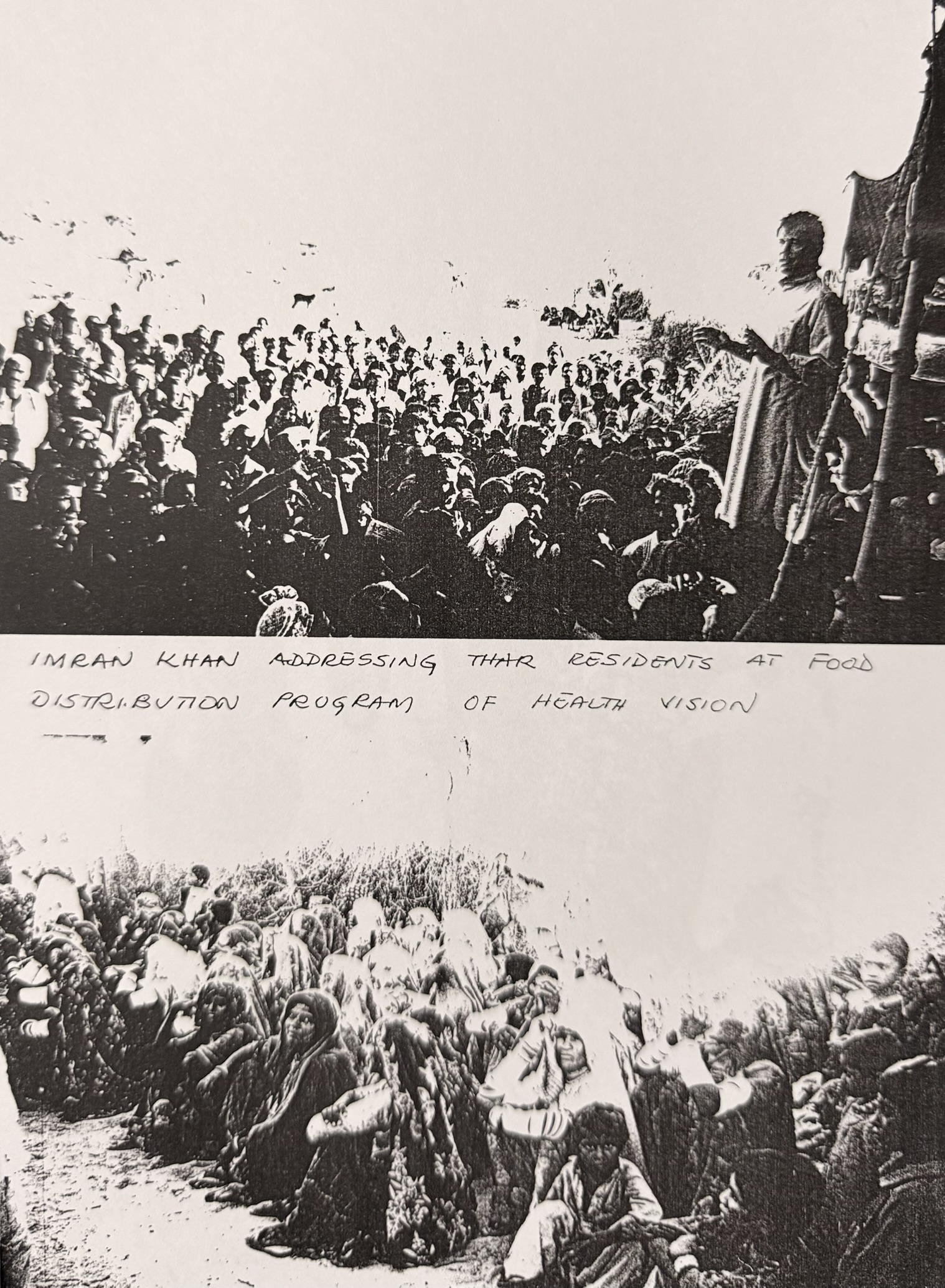
From coordinating logistics to engaging directly with residents — including heartfelt moments with local children — this mission reflected Health Vision’s founding belief: that real healthcare begins where people are hurting most.
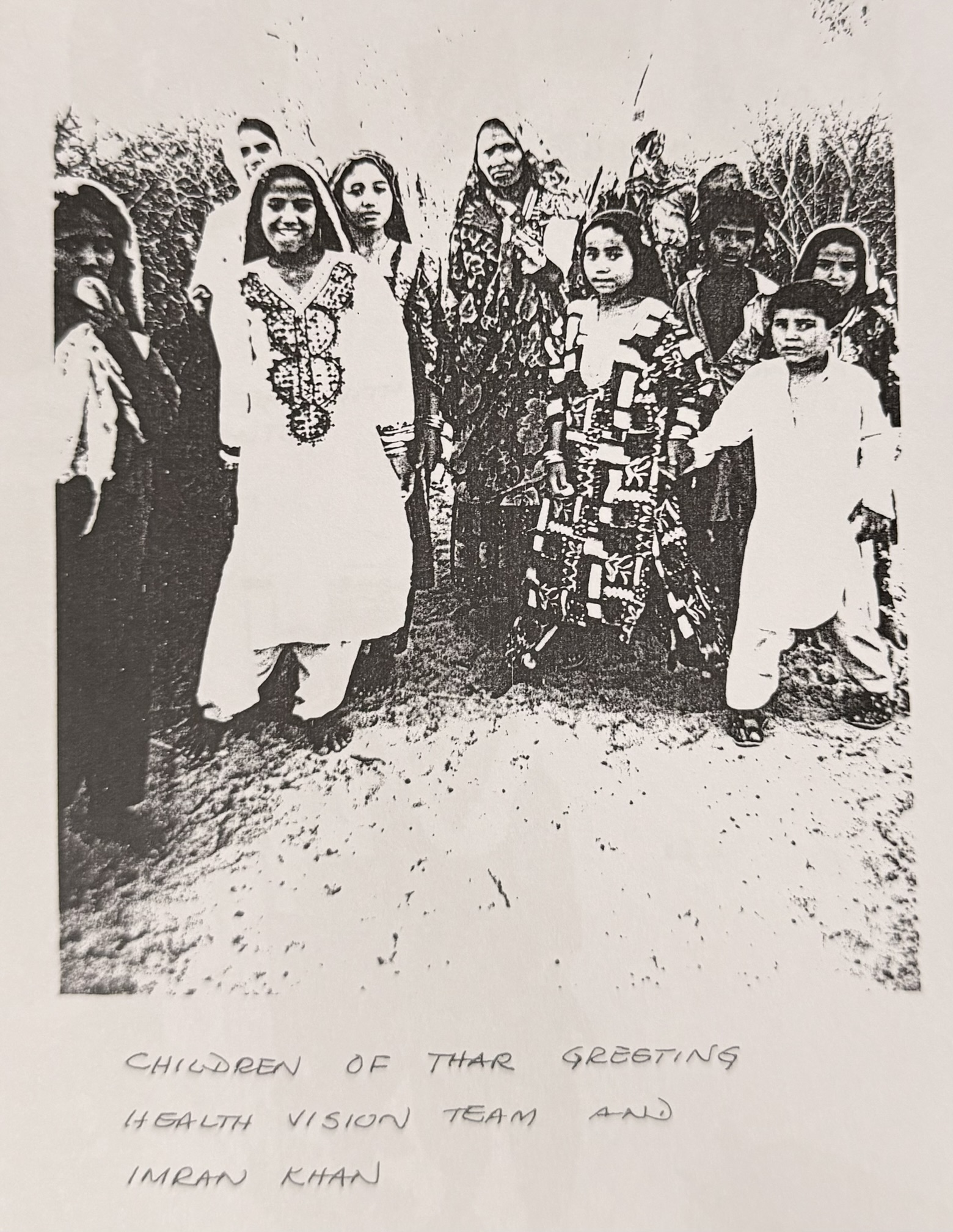
In the aftermath of devastating floods in Badin, Sindh, Health Vision joined hands as a founding member of the non-profit organization, Zindagi Trust, to lead an emergency medical and food relief mission.
A team of 30+ paramedics, doctors, consultants, and volunteers traveled to the region to set up a three-day medical camp, providing essential healthcare to hundreds affected by the disaster.
But the support didn’t stop there — Health Vision also coordinated the distribution of 10 truckloads of food staples, offering much-needed sustenance to displaced families and communities.
This mission marked a deepening of our commitment to emergency response — where collaboration, speed, and compassion came together to serve those hit hardest by crisis.
In 2002, Health Vision was selected as an official Implementing Partner of the United Nations High Commissioner for Refugees (UNHCR). Over five months, our team led a large-scale repatriation project to support Afghan refugees returning home.
We provided healthcare, immunisation, reproductive health education, and infectious disease prevention to over 157,000 refugees — with a focus on women, children, and the elderly. Every service was delivered not just with efficiency, but with dignity.
This project was more than numbers – it was a testament to what happens when community-rooted care meets international trust. And it remains one of our proudest chapters in public health.

That same year, Health Vision joined hands with AIDS IDS to form one of Karachi’s earliest grassroots coalitions focused on HIV/AIDS awareness, prevention, and diagnosis.
In response to a UNFPA/UNAIDS call for work with vulnerable populations, this consortium became a pioneering force — addressing stigma, spreading education, and making testing accessible where it had never been before.
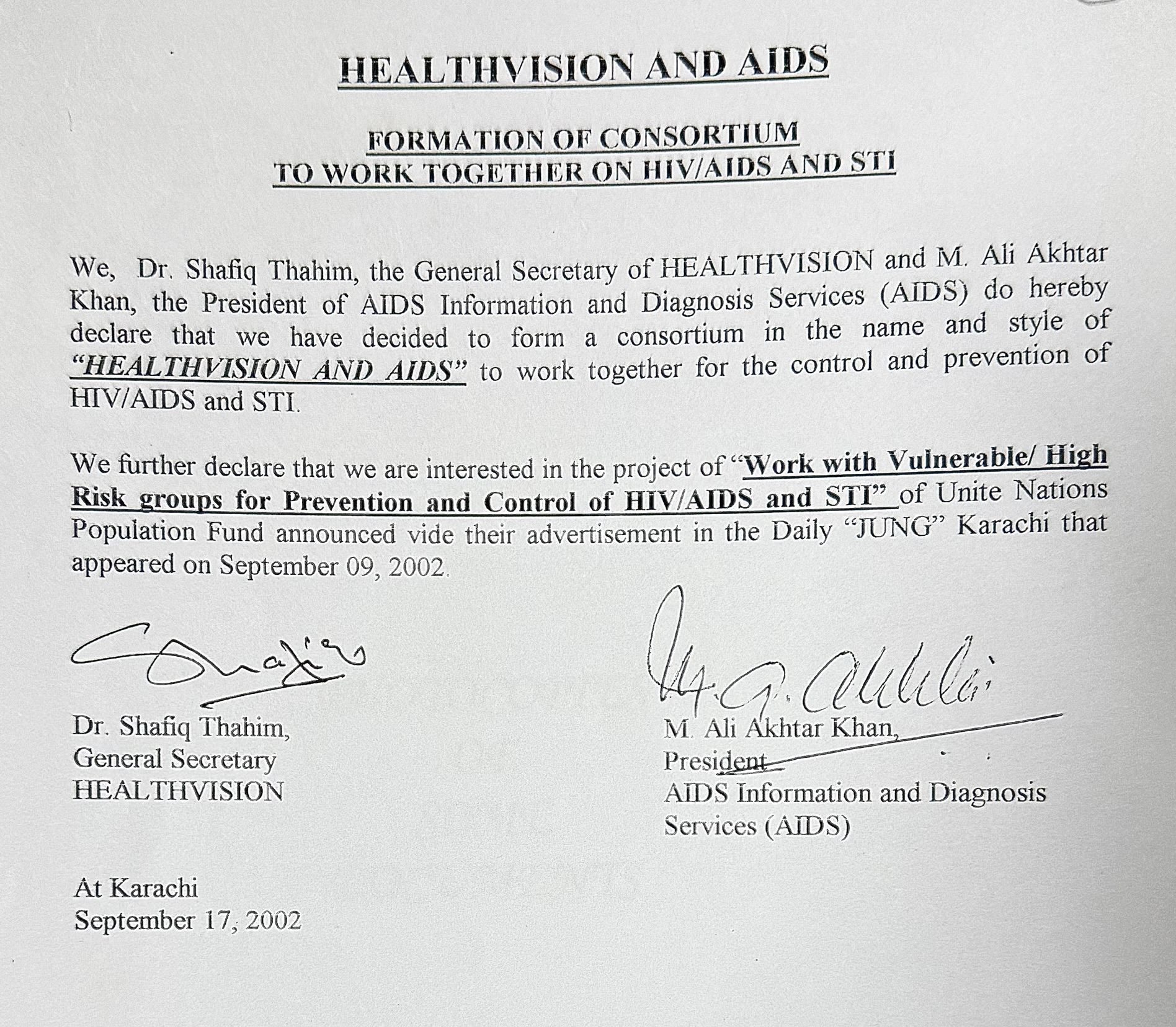
In collaboration with Zindagi Trust, Health Vision helped organize a special exhibition match: World XI vs. Pakistan.
More than just a sporting event, the match brought communities together to raise awareness and support for social welfare initiatives — blending passion, purpose, and public spirit on a national stage.
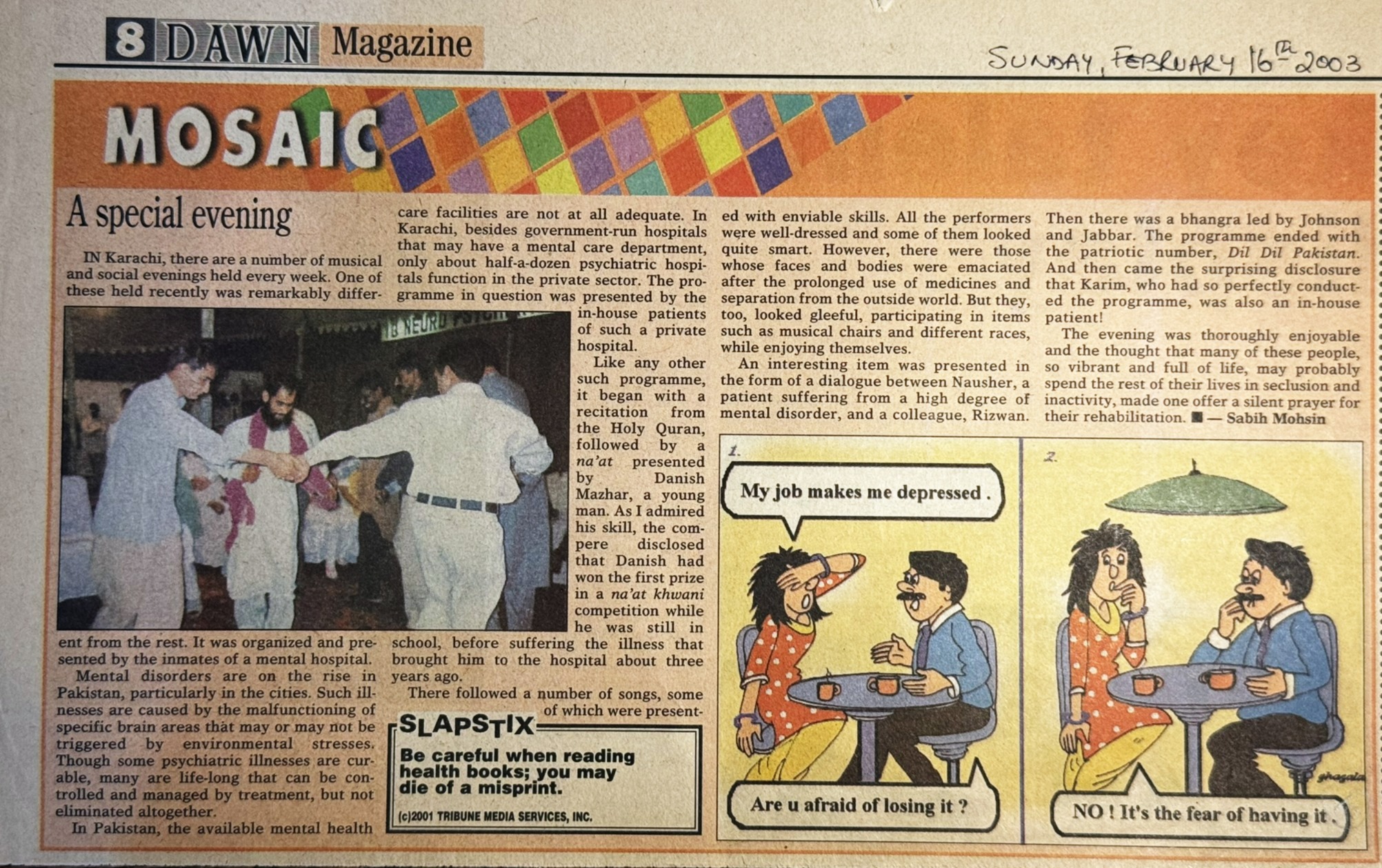
An extraordinary musical evening held entirely by psychiatric inpatients reminded us that healing is not just about medication — it’s about dignity, creativity, and connection.
From soulful na’ats to energetic bhangra, the night echoed with joy, talent, and hope. Long before mental health care became mainstream, our work focused on humanising it
At a time when HIV/AIDS was still shrouded in stigma, Health Vision stepped into classrooms and communities with bold, education-first programming.
Featured in national publications such as The News International and Financial Post, our AIDS awareness campaigns were designed for schools, colleges, and vulnerable youth groups. The aim wasn’t just to educate — it was to destigmatize.
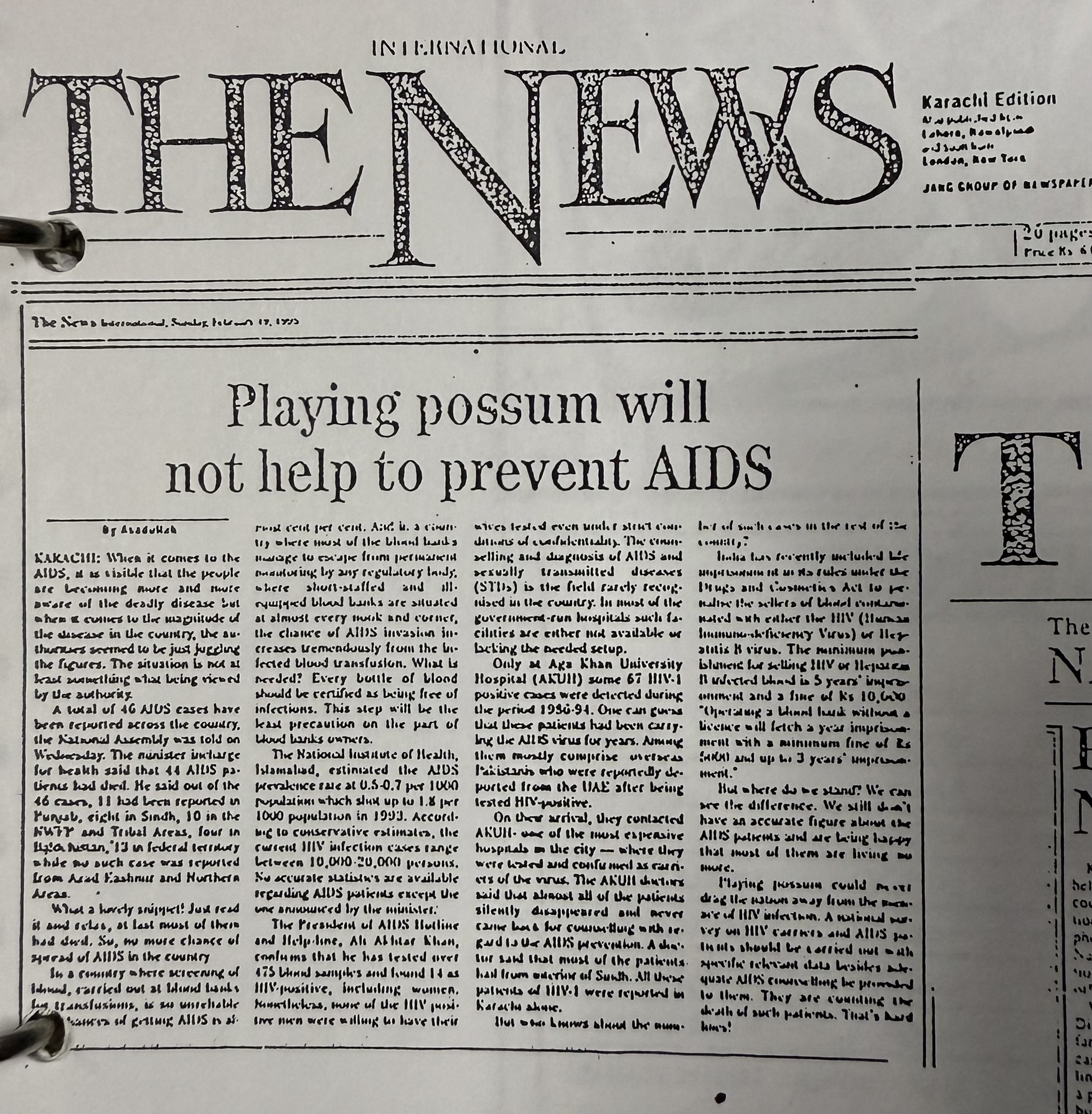
We trained teachers, hosted interactive sessions, and used real-life stories to counter myths. While others played possum, we chose action.
It was one of Pakistan’s earliest grassroots interventions of its kind — and Health Vision was at the forefront.
As part of Zindagi Trust, Health Vision helped organize one of Pakistan’s most unforgettable fundraising events — “Rock for a Cause,” featuring global music icon Bryan Adams.
The concert drew massive crowds and nationwide media coverage, making headlines not just for the performance, but for the purpose behind it. It was a moment when celebrity met cause — and the energy of a stadium helped power change in classrooms and clinics across the country.
In partnership with Zindagi Trust, Health Vision helped launch schools in poverty-affected communities under the “I Am Paid to Learn” program.
Children were given a Rs. 20 daily stipend to attend classes — turning education into both a right and a reward. For many, it was their first time in a classroom. For us, it was a step toward lasting, dignity-driven change.
In collaboration with the AIDS Society, Health Vision conducted a series of seminars, workshops, and lectures in juvenile jails and detention centers across Karachi.
The focus: HIV/AIDS prevention, education, and destigmatization — reaching vulnerable youth often left out of public health efforts. It was a bold step toward inclusive, rights-based healthcare education.
Following the catastrophic earthquake in Pakistan’s Northern Areas, Health Vision set up a 2-month relief camp in the affected areas, including Balakot.
With a team of 40 doctors and paramedics, we provided food, clothing, and medical aid to affected families — standing in solidarity with survivors during one of the darkest chapters in the country’s history.
Since 2006, Health Vision has been providing psychiatric consultations and nutritional support to children in the Garhi Khairo district, Jacobabad.
Through regular check-ins and food supplements, this long-standing program supports emotional well-being and healthy development for some of the region’s most vulnerable children.
Between 2007 and 2009, Health Vision supported small business creation through microfinance, helping individuals build sustainable livelihoods.
From opening carpentry shops and grocery stores to setting up fruit stalls, these ventures empowered families with dignity, income, and long-term independence.
In partnership with House of Dreams NGO and Nixor College, Health Vision led a powerful youth-led relief mission to Gari Khairo, Jacobabad following catastrophic floods.
A dedicated group of Nixor College students joined on ground, helping build 20 pre-fabricated steel houses and 50 cemented homes for displaced families.
With support from the local government, we also provided medicines, food staples, and tents — ensuring urgent needs were met.
This initiative wasn’t just about rebuilding homes — it was about nurturing a new generation of socially conscious leaders through direct action and compassion.
Since 2010, Health Vision has been installing handpumps across water-scarce regions of Jacobabad, Thatta, and Badin.
This ongoing effort has helped hundreds of families gain reliable access to clean water, reducing the burden on women and children and supporting better health outcomes in underserved communities.
In collaboration with Alamgir Welfare Trust, Health Vision helped distribute Rs. 25 million in cash assistance for the purchase of food staples.
This initiative empowered families to meet their needs with choice and dignity — offering support that was both immediate and respectful.
Over the span of two years, Health Vision led a massive Hepatitis B vaccination drive, reaching over 80,000 families across interior Sindh.
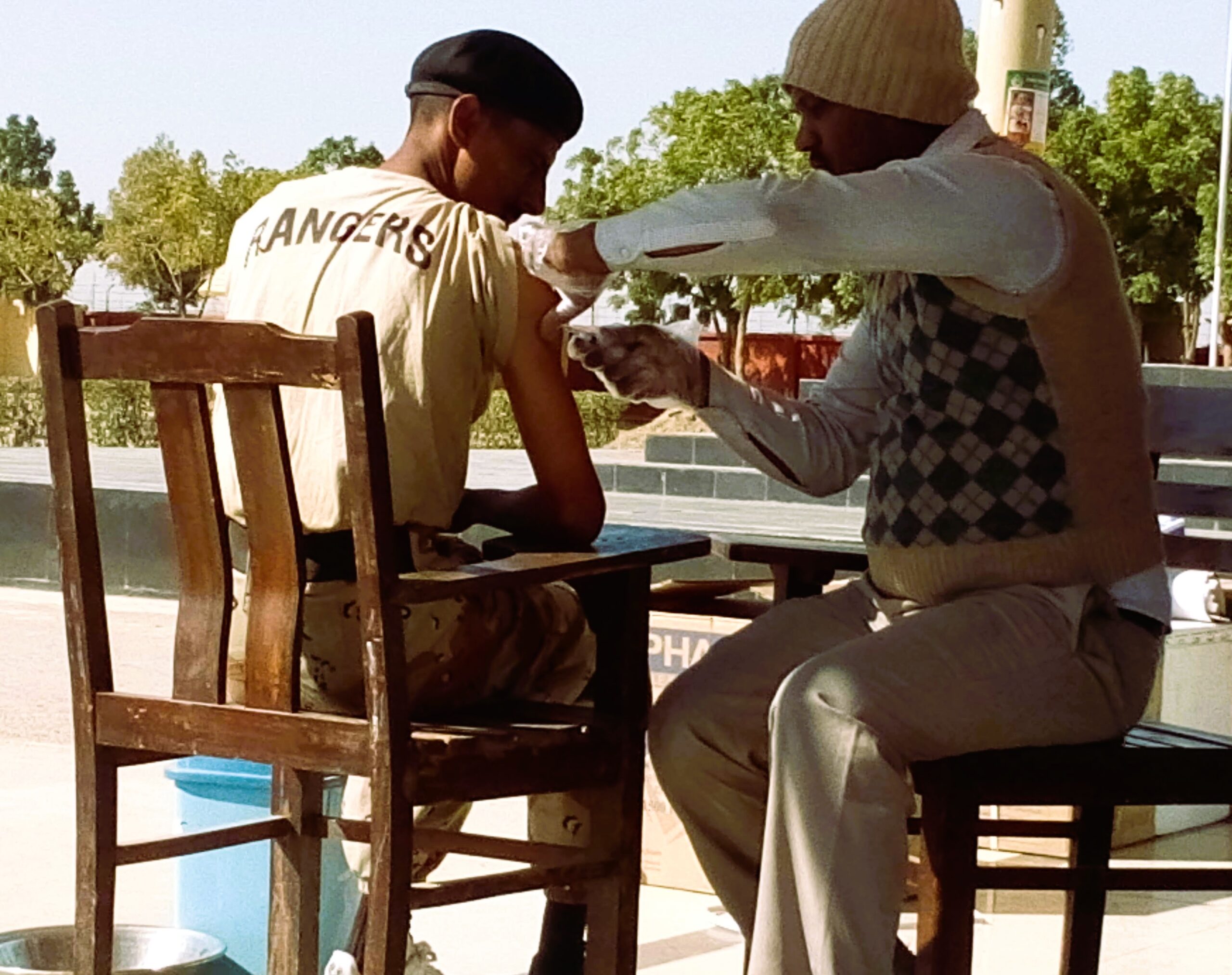
The campaign also extended to Pakistan Rangers, Airport Security Force (ASF) personnel, and underserved areas of Karachi — ensuring protection for both vulnerable communities and frontline forces.
It remains one of our largest preventive healthcare efforts to date.
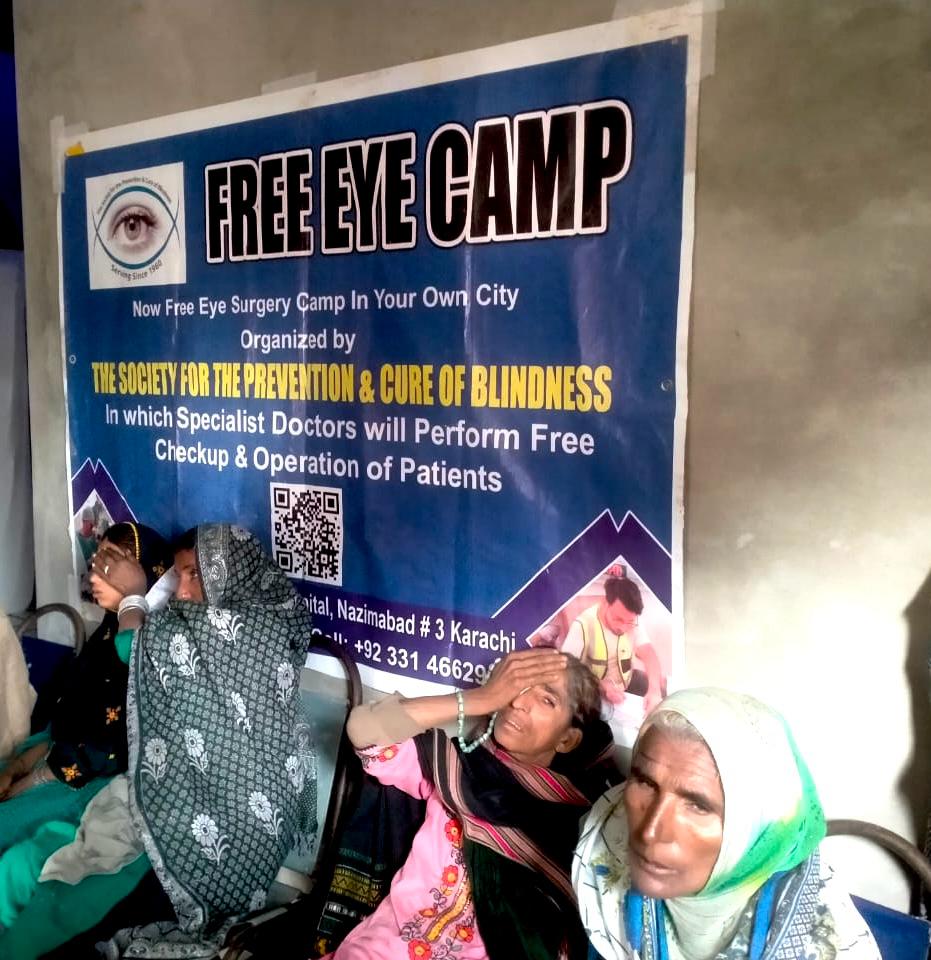
Since 2015, Health Vision has been conducting free surgical eye camps in collaboration with Saylani Welfare Trust (SWT), the Eye Society, and independent efforts.
Operating across multiple districts — including Jacobabad, Gul Wah Sheranpur, Dakhan, Garhi Yasin, Shikarpur, Ratodero, Mohammad Pur, Dawoo, Kambar Shahdadkot, Dadu, Shahpur, Shahpur Chakar, and Sanghar — the camps provide over 10,000 intraocular lenses (IOLs) annually, free of cost.
These camps have restored sight and independence to thousands, becoming one of Health Vision’s longest-running and most transformative public health initiatives.
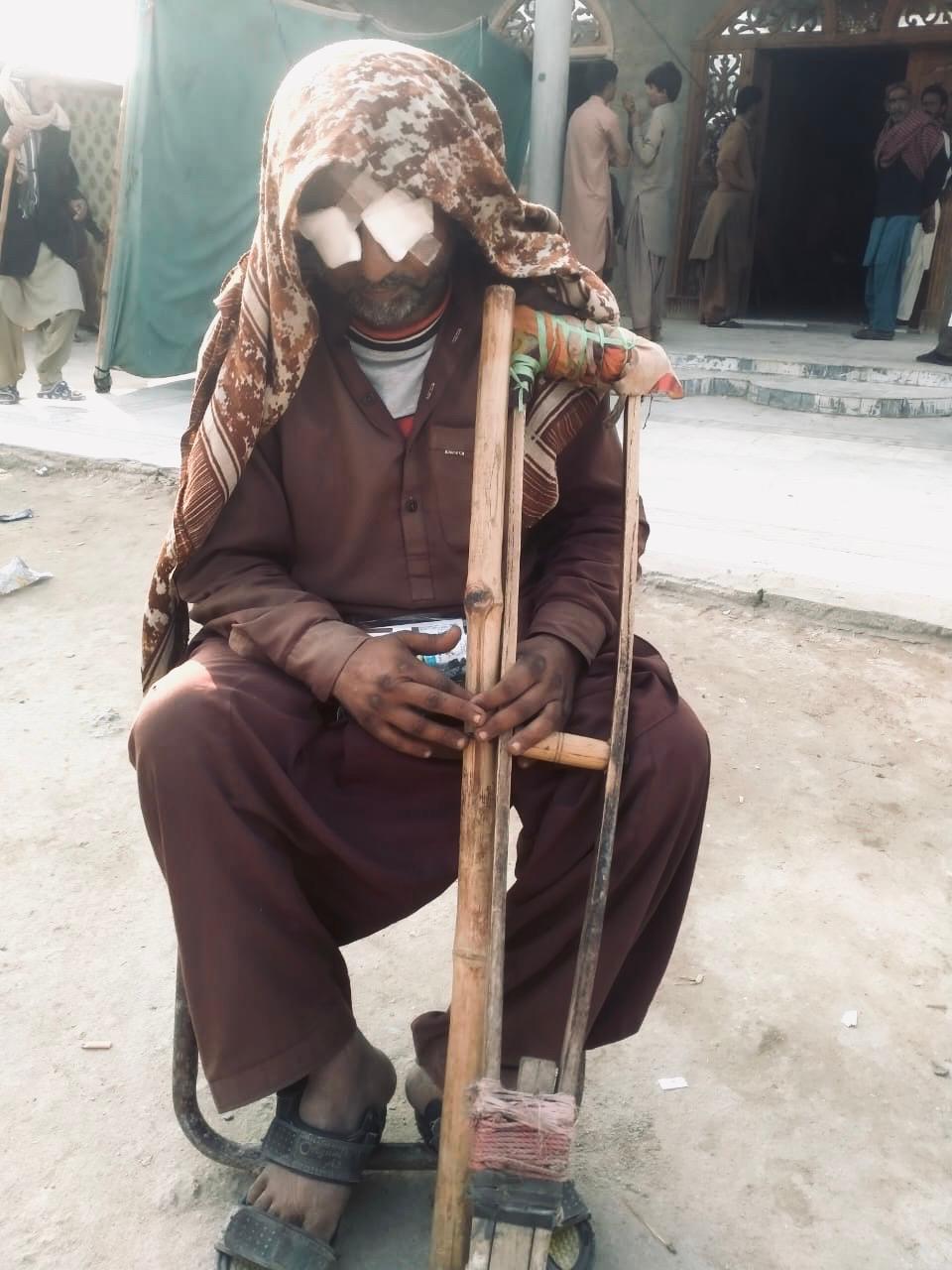
In collaboration with Voice of Karachi (VOK), Health Vision supported a city-wide campaign across all districts of Karachi — setting up Sabeel camps, distributing water coolers, ORS, and towels to help residents cope with extreme heat.
Beyond immediate relief, we also partnered with local representatives to build roads and repair sewerage lines, addressing the long-standing infrastructural needs of underserved neighborhoods.
Between 2017 and 2019, Health Vision provided roofing materials to families living in semi-permanent housing across underserved areas.
This simple yet impactful support helped improve safety, comfort, and dignity for countless households facing harsh weather and fragile living conditions.
Following the 2021 floods in Karachi, Health Vision took on a coordination role — identifying remote areas in Sindh and Balochistan for targeted relief efforts.
For months, we supported on-ground teams by guiding where aid was needed most, ensuring relief reached overlooked, flood-affected communities across the region.
In 2025, Health Vision supported the construction of three masjids in Meeran Shah, Kudan Thahim, and Gul Wah — creating spaces for prayer, reflection, and unity.
Alongside this, we continue to sponsor the religious education of over 150 students, including monthly support for Hafiz-e-Qur’an enrolled in Qur’anic studies.
This initiative reflects our enduring belief that spiritual well-being is an essential part of holistic community care.
